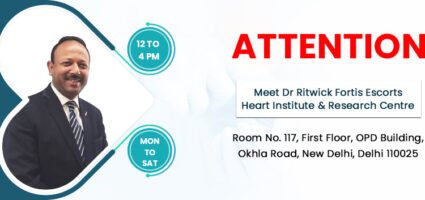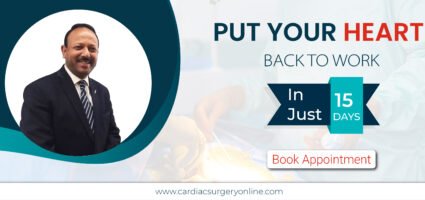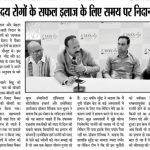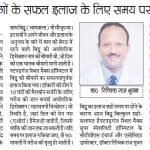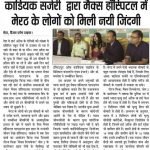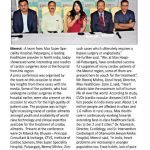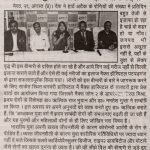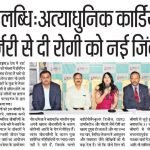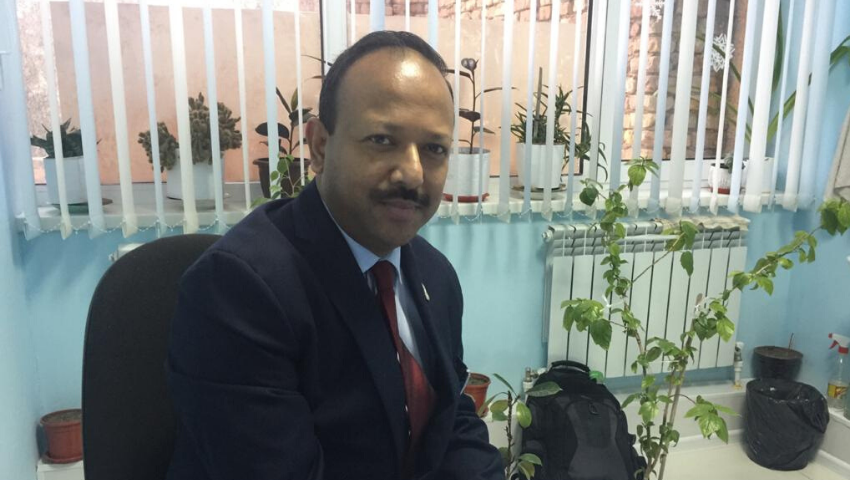What is Cardiac Surgery?
Cardiac Surgery is the branch of surgery that deals with the prevention, study, and treatment of diseases of the heart, pericardium and great vessels. Its scope is – congenital and acquired abnormalities of the heart, pericardium and great vessels. Affections of the systemic venous system, Heart transplantation, Procedures and precise techniques for carrying out its activity (perfusion, circulatory assistance, blood conservation, etc.). Pre, per, and postoperative study, preparation, and treatment of patients in their field of action.
Application of the techniques of the specialty in the context of the performance of other medical specialties. Although cardiac surgery is a young specialty, it has evolved a lot throughout history. In recent years the use of minimally invasive techniques in all medical procedures is increasing. Cardiac surgery was not going to be less, highlighting the development of valvular prostheses that are implanted without extracorporeal circulation, such as transapical aortic surgery.
Cardiac surgery is a major surgical procedure. It's typically performed in a hospital setting by a team of surgeons specializing in cardiothoracic surgery. When we talk about cardiac surgery, we're referring to any type of heart surgery performed on the heart muscle, valves, vessels, or pacemaker. Some common examples include open-heart surgery and heart transplantation.
Cardiac Surgery Procedures:
- Coronary Artery Bypass Surgery
- TAVR (Transcatheter Aortic Valve Replacement)
- Heart Valve Surgery
- Left Ventricular Assist Device (LVAD)
- Minimal access CABG or Key hole CABG
- Minimally Invasive Bypass Surgery
- Surgery for Aortic Dissection
- Thoracic Aortic Surgery
- Extracorporeal Membrane Oxygenation (ECMO)
- Video Assisted Key Hole Mitral Valve Procedure
Minimally invasive cardiac surgery is a form of surgery that involves smaller incisions, scarring, and recovery periods than traditional surgery. The surgeons access the heart through a small incision in the patient's chest wall. Some procedures are performed with just a single incision, while others require two or three incisions between 1 and 2 inches (2.5 to 5 cm) each. A video camera is inserted through one of the ports to allow the surgeon to view the inside of the patient's body. Surgical instruments are inserted through the other ports.
Most minimally invasive cardiac surgeries are performed using either a midline sternotomy or a partial sternotomy:
- Midline sternotomy: An incision is made from below the chin to above the navel so that a vertical section of bone can be removed from the breastbone (sternum). This procedure requires up to two weeks for recovery.
- Partial sternotomy: An incision is made in the breastbone, but no bone is removed. Recovery time for this type of surgery can be around two or three days because there is less pain and bruising.
Minimally invasive cardiac surgeries may allow the patient to recover more quickly than they would when undergoing traditional heart surgeries. However, not all patients are eligible for minimally invasive cardiac surgery, as it cannot be performed on those who have heart blockages that are too large or too numerous to be treated via keyhole surgeries.
There are several benefits to MICS, including:
- Less pain after the procedure due to smaller incisions
- A quicker recovery period, as there is less trauma to the body
- A lower risk of infection due to less exposure to germs
A Cardiac Surgeon is a doctor who performs surgery on the heart. The heart is the organ that pumps blood to all parts of the body, including the brain and all other organs. A cardiac surgeon may also be called a cardiothoracic surgeon or cardiovascular surgeon.
Cardiac surgeons typically perform correctives on the heart's valves and vessels in order to restore proper function to the heart. They may also remove tumors from the heart or surrounding vessels. In some cases, cardiac surgeons may be involved with transplanting the heart or a portion of it into a patient who needs a new heart. Cardiac surgeons can be found at hospitals or private practices in most major cities.
Cardiac surgeons are highly trained medical professionals who specialize in the surgical treatment of heart disease. Cardiac surgeons perform surgeries on the heart and its surrounding vessels (including coronary arteries, veins and valves) as well as other procedures that may be required during open-heart surgery.
Cardiac surgeons work with cardiologists to diagnose and treat patients with cardiovascular diseases or disorders. They primarily operate on adult patients who have been referred from other physicians or hospitals. Cardiac surgeons may also consult with patients about their health history and any family history of heart disease before surgery.
As part of their job, cardiac surgeons use surgical tools like scalpels, sutures, staplers, and retractors to repair damaged body parts during operations. They also monitor patients' vital signs throughout surgery and inspect incisions to make sure they are healing properly after surgery. Cardiac surgeons help coordinate patient care with a team of nurses, physician assistants, and other healthcare professionals before, during, and after surgery.
Cardiac surgeons operate on the heart and blood vessels. They are medical doctors who have completed a medical school program, followed by a residency in general surgery, and then an additional residency in cardiac surgery. This is usually a five-year program. In addition to operating on the heart during surgery, cardiac surgeons also perform diagnostic tests such as angioplasty, which involves threading a catheter into a blood vessel in the groin or arm and using it to open up narrowed coronary arteries.
If you want to be a cardiac surgeon, the first thing you need to do is get a bachelor's degree from a 4-year college or university. After that, you need to complete 4 years of medical school followed by 5 years in general surgery. Once you're done with general surgery, you'll spend an additional 2-3 years in a special residency program for heart surgery. The entire process can take as long as 14 years!
While most cardiac surgeons hold both a bachelor's and doctorate degree, some have master's degrees in either physiology or biochemistry.
To become a cardiac surgeon, you first need to complete an undergraduate degree. Then you must pursue medical school and complete a residency program. After your residency, you will need to pass a state licensing exam. Optionally, you can also choose to obtain board certification.
- Find a good school
- Find a mentor
- Study hard and get good grades
- Get an internship at a hospital or clinic and do well there
The answer depends on the patient's needs. If a patient has heart disease, a cardiologist is better suited to treat it. A cardiac surgeon is better suited if the patient needs surgery. When it comes to the heart, a cardiologist and cardiac surgeon are two very different professionals.
A cardiologist is a doctor who specializes in the heart. They can help you manage your blood pressure, cholesterol, and diabetes. If you need a stent or other type of surgery, they will refer you to a surgical specialist. A cardiac surgeon is a doctor whose specialty is surgery on the heart.
While both types of doctors can help patients with conditions like high cholesterol, diabetes, and heart disease, only a cardiac surgeon can operate on the heart itself.
The best way to choose between these two careers is to ask yourself these questions:
- Do I want to go into surgery?
- Do I want to take a more hands-off approach?
- Do I like working with patients?
- Do I like solving complex problems?
If you are looking for best Cardiac Surgeon in India so you should contact Dr. Ritwick Raj Bhuyan
Dr. Ritwick Raj Bhuyan is a Cardiothoracic and Vascular Surgeon in Delhi with more than 20 years of working experience in high-volume cardiothoracic centers in India and Australia. He has been associated with nearly 30,000 open heart procedures and independently performed about 12,000 complex open-heart procedures.
He is also a Director at Fortis Escorts Heart Institute, Okhla Road, New Delhi, India. Here you can directly book an appointment with Dr. Ritwick Today.

